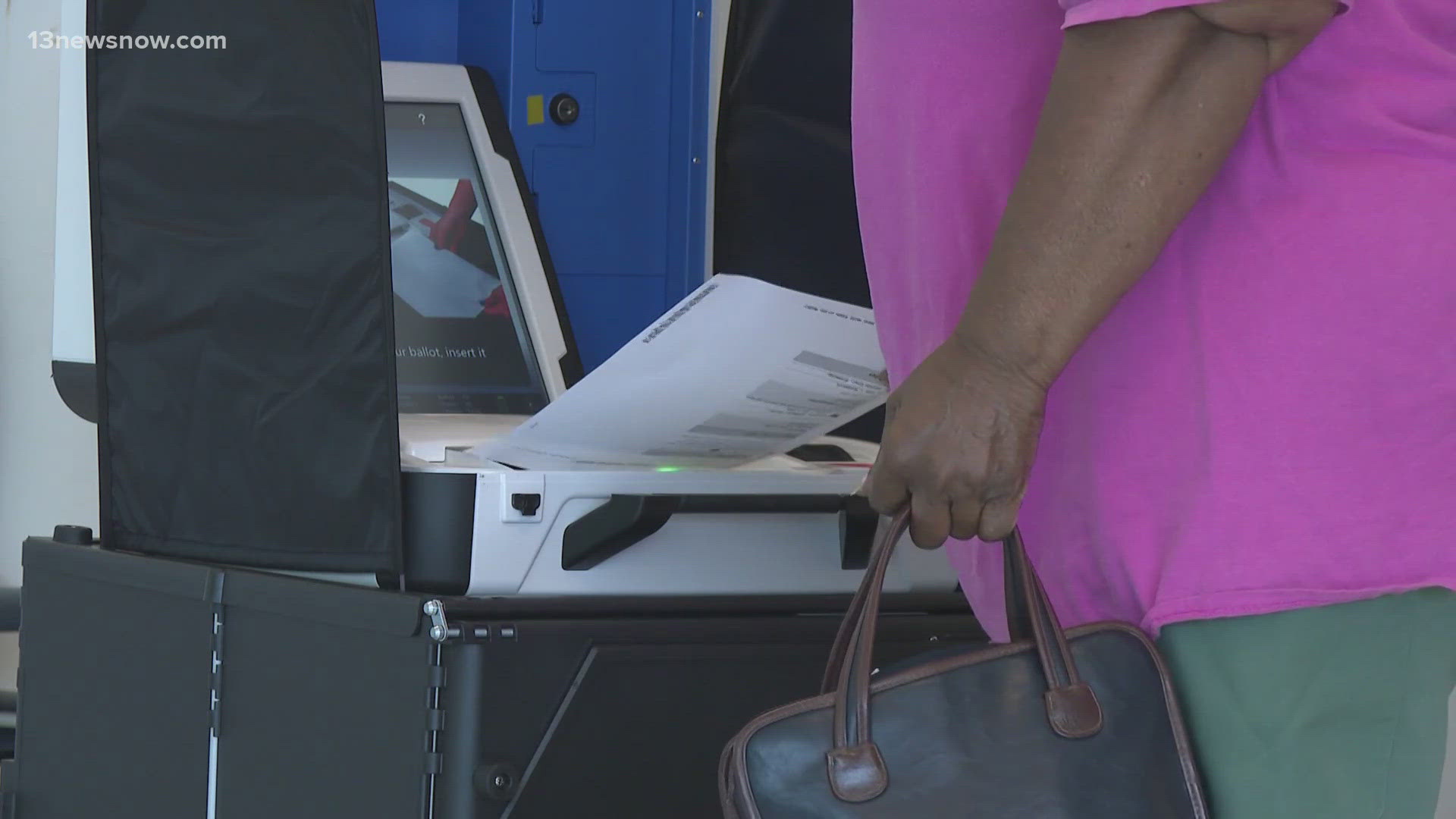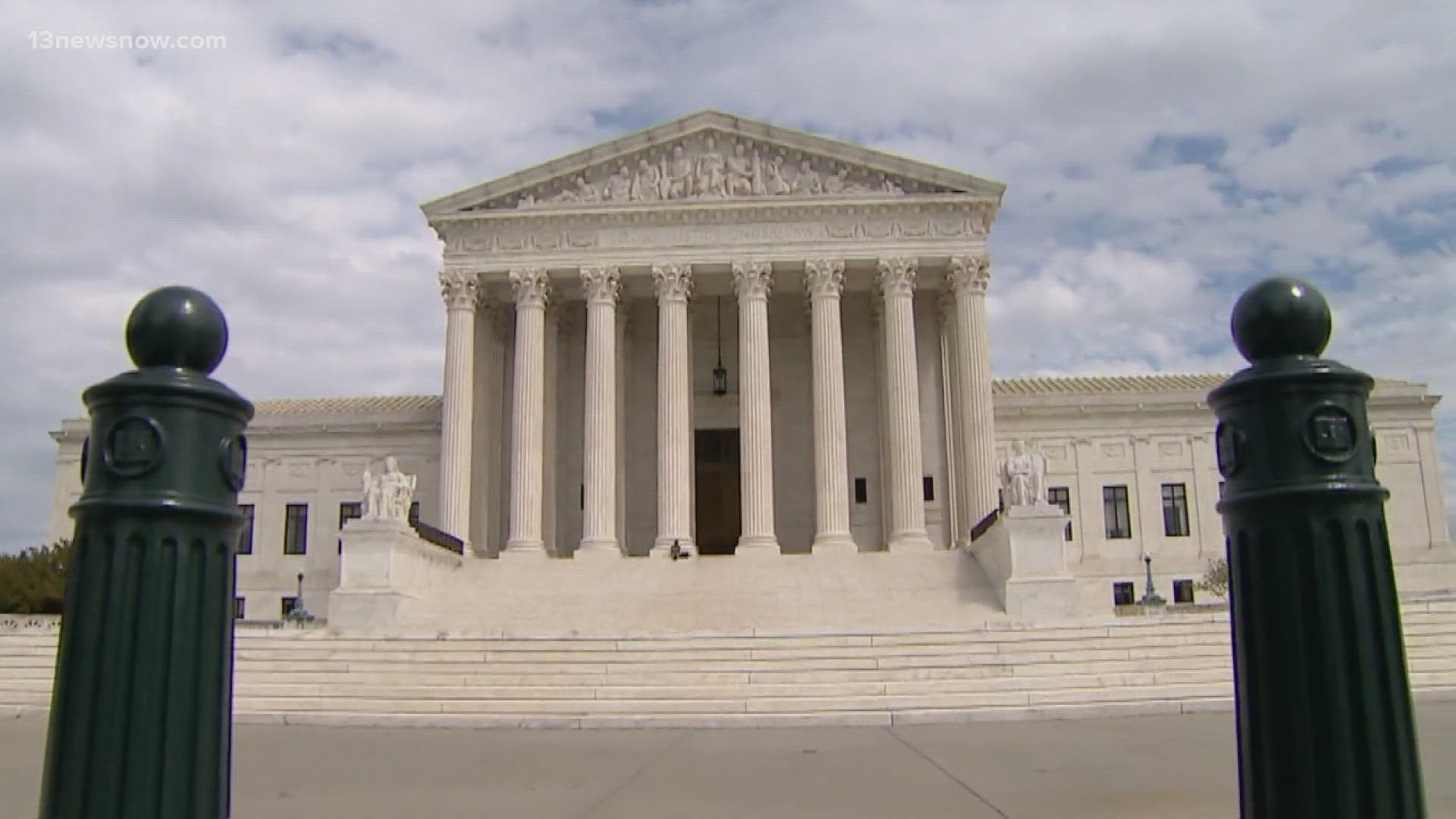WASHINGTON D.C., DC — The Supreme Court's conservative majority on Wednesday allowed Virginia to resume its purge of voter registrations that the state says is aimed at stopping people who are not U.S. citizens from voting.
The high court granted an emergency appeal from Virginia's Republican administration led by Gov. Glenn Youngkin. The court provided no rationale for its action, but it did fall on ideological lines. The six conservative justices were in favor and the three liberal judges were in dissent of the decision.
Rebecca Green, an associate professor of law at William and Mary Law School, weighed in on Wednesday. “We don’t know the reason behind the Supreme Court issuing this stay, but it could be perhaps that they don’t agree with the Fourth Circuit on this question of systemic removal," said Green. "But it could be because the court was worried about a federal court intervening in the state’s process.”
The justices acted on Virginia's appeal after a federal judge found that the state illegally purged more than 1,600 voter registrations in the past two months, including more than 200 people in Hampton Roads. A federal appeals court had previously allowed the judge's order to remain in effect.
Such voting is rare in American elections.
Virginia Wesleyan University Associate Political Science Professor Leslie Caughell does not believe non-citizens casting votes in the presidential elections is an issue in Virginia.
“There’s no huge influx of immigrants voting, so a law like this, which is in actuality potentially disenfranchising people who are citizens and should vote, is creating a problem that does not exist,” said Virginia Wesleyan University Associate Political Science Professor Leslie Caughell.
Caughell also believes the decision could impact ordinary citizens who made mistakes while filling out paperwork at the Department of Motor Vehicles.
“You fill out paperwork at the DMV. Sometimes you’re rushed, sometimes you’re annoyed, sometimes you’ve been waiting four hours, and you just want to get out of there. The idea that some people who failed to check a box on citizenship or who checked the wrong one seems possible to me,” said Caughell.
Meanwhile, the specter of immigrants voting illegally has been a main part of the political messaging this year from former President Donald Trump and other Republicans.
Trump had criticized the earlier ruling, calling it "a totally unacceptable travesty" on social media. "Only U.S. Citizens should be allowed to vote," Trump wrote.
The Justice Department and a coalition of private groups sued the state earlier in October, arguing that Virginia election officials, acting on an executive order issued in August by Youngkin were striking names from voter rolls in violation of federal election law.
The National Voter Registration Act requires a 90-day "quiet period" ahead of elections for the maintenance of voter rolls so that legitimate voters are not removed from the rolls by bureaucratic errors or last-minute mistakes that cannot be quickly corrected.
Youngkin issued his order on Aug. 7, the 90th day before the Nov. 5 election. It required daily checks of data from the state Department of Motor Vehicles against voter rolls to identify people who are not U.S. citizens.
Protect Democracy, one of the groups that brought the lawsuit, cited media interviews with voters as showing that the Youngkin administration's purge has removed U.S. citizens from the voter rolls.
One example is Nadra Wilson, who lives in Lynchburg, Virginia, and told NPR she got swept up in the purge. "I was born in Brooklyn, N.Y. I'm a citizen," Wilson said, before showing her American passport as proof of her citizenship.
Groups like The Virginia Coalition for Immigrant Rights and The League of Women Voters describe the Supreme Court ruling as disappointing. Joan Porte, the president of The League of Women Voters Virginia, said: “By permitting these systematic voter purges, the court jeopardizes the integrity of our elections and silences our voters.”
Project Democracy added in a statement that "this program removes eligible voters. Virginia has not presented any evidence of noncitizens participating in elections. Because there is none. And it's actually eligible VA voters that have been caught in the middle of this election-subversion scheme."
People can still register to vote in Virginia's early-voting period or on Election Day, and cast provisional ballots, voting advocates said.
U.S. District Judge Patricia Giles said elections officials still could remove names on an individualized basis, but not through a systematic purge.
Giles had ordered the state to notify affected voters and local registrars by Wednesday that the registrations have been restored.
Youngkin said the Supreme Court's action was "a victory for commonsense and election fairness."
"Clean voter rolls are one important part of a comprehensive approach we are taking to ensure the fairness of our elections," he said in a written statement.
Nearly 6 million Virginians are registered to vote.
In a similar lawsuit in Alabama, a federal judge this month ordered the state to restore eligibility for more than 3,200 voters who had been deemed ineligible noncitizens. Testimony from state officials in that case showed that roughly 2,000 of the 3,251 voters who were made inactive were actually legally registered citizens.
The Virginia Coalition for Immigrant Rights and The League of Women Voters say they will be looking at potential next steps following the Supreme Court’s emergency appeal ruling.
Legal expert Ed Booth said that what happens next is in the hands of the courts.
“This order is laying out, you know, all of the things that could happen throughout the appeal process. The Supreme Court could decide not to hear it, but then the state is done. They could decide to hear it, and then they’ll make their ruling," said Booth.
Caughell does not believe it will impact future presidential elections in Virginia.
“Practically, I think this is unlikely to have a huge impact on Virginia elections in the near future. First, because we’re not a swing state, at least not in these election. It looks pretty likely that Harris [will] take the state by a decent margin," said Caughell.
The associate political science professor also said she does not believe Wednesday's decision will impact voter turnout but instead encourage more people to vote.


